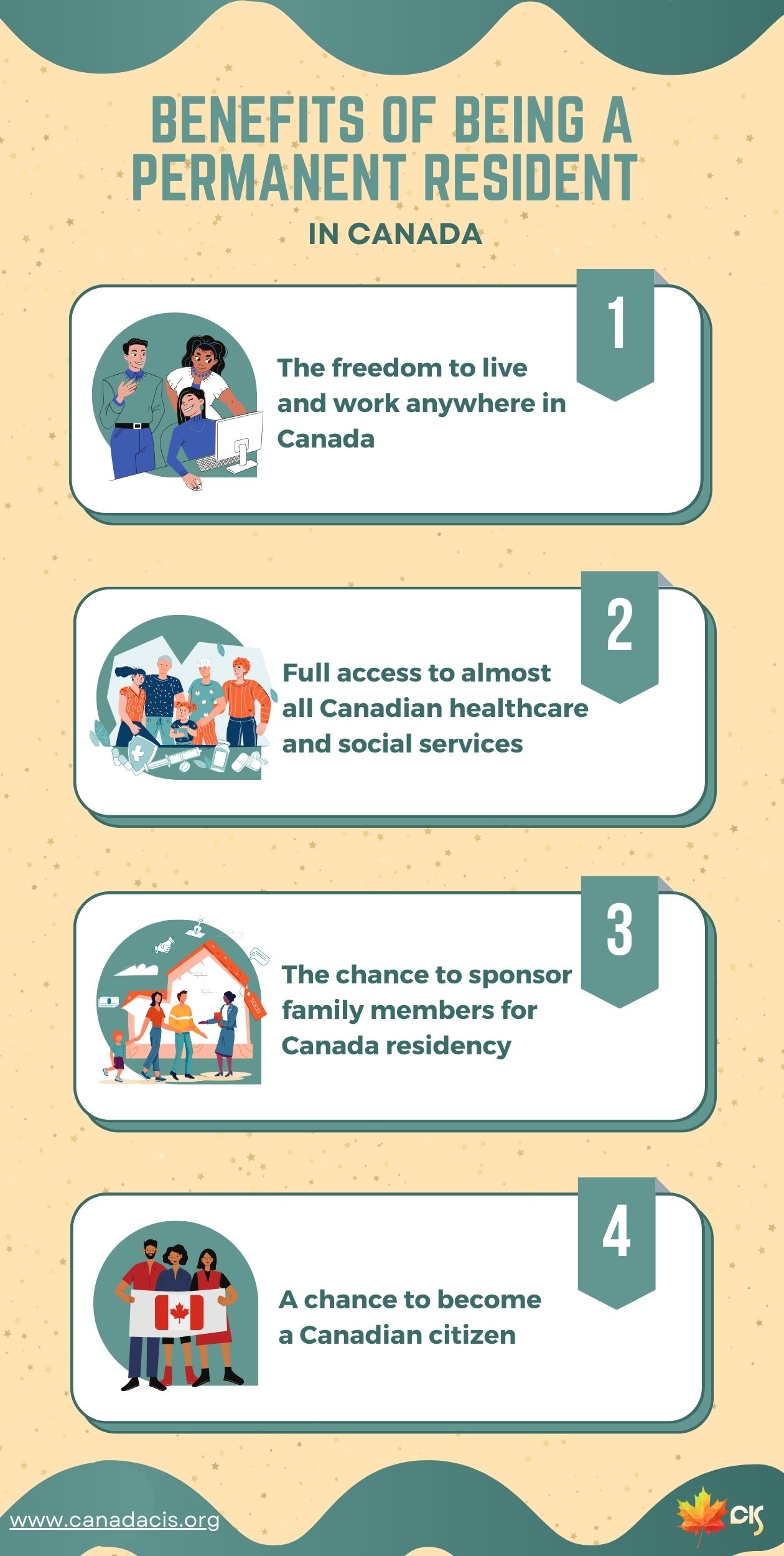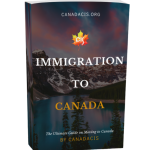Permanent Residency Canada
Permanent residency in Canada is a status granted to a non-Canadian citizen. It gives the grantee the right to live and work in Canada without any time limit on their stay. For a foreigner to become a Canadian permanent resident, they must apply to Immigration, Refugees and Citizenship Canada (IRCC), formerly known as Citizenship and Immigration Canada, under any of their several programs.
A Canadian permanent resident gets a valid permanent resident card or a permanent resident travel document (PRTD) from the Canadian government. They must always make it available to present during all travels to and around Canada. Take note: becoming a Canadian permanent resident does not mean that you are already a Canadian citizen; you may still be a citizen in a different country – usually your country of origin.
So, are you thinking of applying for permanent residency in Canada and don’t know where to start? We have covered the details of Permanent Residency in Canada in this article. So, read on!
Table of Contents
✈️ The Best Immigration Programs for Permanent Residency
To ensure your preparedness to apply for Canada residency, you should first research, review, and choose the program you think would be most suitable for you.
There are a good number of immigration programs that you can choose from.
Some of the best immigration programs available for permanent residency are:
This program is the quickest option for permanent residency in Canada. The Express Entry is an online system that the Canadian government uses to screen and recruit applicants who plan to enter the country to live and work as skilled workers.
The Business Immigration program is open for successful business people seeking new opportunities and challenges in Canada.
This program allows sponsored candidates to come and live in Canada through a relative who is a Canadian citizen or permanent resident.
The Provincial Nominee Programs are available to candidates with the proper skills and work education to boost their chosen province’s economy.
📑 Application to Permanent Residency: Requirements
Make sure to gather the required documents ahead of time; it is best to be prepared in advance than to search for your documents during application. Check your passports’ expiration dates, government issues IDs, and other valid IDs needed for the application. Below is the list of complete requirements for your PR application:
- Proof of sufficient funds to support yourself during your time in Canada
- Taking the skills assessment test
- Results from your language test(s)
- All original and copies of documents that should support your application (EX. educational degrees/diplomas, personal identification records, a letter from the spouse, and other information)
- A completed permanent resident visa application
- Payment for application and other applicable fees
- Showing up to interviews with immigration representatives
✍️ How to Apply for Canadian Permanent Residency
The following are step by step on applying for a Canadian Permanent Residency status.
- Birth certificate
- Marriage certificate
- Use of representative form (only needed if you hired a representative)
- Adoption certificate (as applicable)
- Divorce certificate (if divorced)
- Death certificate (for widows)
- Police clearance certificate
- Proof of finance
- Medical examination results
- Evidence of sponsor’s Canadian citizenship or permanent residence
Make sure to fill out the application completely, and all information should be accurate and correct. If a particular section does not apply to you, write “NA.” Do not leave your application incomplete.
Upon completion of the application, make sure to click the “validate” button located on the form.
Note: this only applies to online applications.
The total cost of Canada’s permanent residency processing fee is CAD500 per adult. Paying for it right away is highly recommended; to avoid any application processing delays. To pay for your application fees, you will need access to the following:
- A valid email address;
- Printer for printing the receipt
- A credit card
Disclaimer. The CAD500 is just for the permanent residency processing fee. It does not cover other fees, such as biometrics, medical examinations, Right of Citizenship fee, or additional fees for dependents such as spouse and children.
Last but not least is to submit your application form.
You may submit your application, payment for fees, and supporting documents in a 23 cm x 30.5 cm (9” x 12”) envelope through mail-in.
Tip: CanadaCIS includes services that can help and make this process easy for you. CanadaCIS can submit it on your behalf so that you don’t have to do it by yourself, without professional guidance.
👨👩👧👦 The Benefits of Becoming a Permanent Resident in Canada
Becoming a permanent resident in Canada is truly something to look forward to. The benefits and opportunities in this country are endless, and there’s nothing more rewarding than to finally feel like a part of one of the best countries in the world. The following are just a few benefits of being a permanent resident of Canada.
🏠 What is a Canada Permanent Resident (PR) Card?
The Permanent Resident (PR) Card represents your PR status in Canada. You will need to show this card along with your passport when returning to Canada, whether via land, air, and sea.
It’s best to take it everywhere you go outside of Canada and during long travels.
Always make sure to check the expiration date of your card.
A PR card is typically valid for 1 to 5 years. Most applicants will receive their PR cards by mail. Canada does not mail PR cards outside of the country, so if you plan on receiving one, try to find someone within Canada who is trustworthy enough to accept it for you.
📇 What You Should Know About the Canada PR Card
The Permanent Resident (PR) Card is a representation of your PR status in Canada.
You will need to show this card along with your passport when returning to Canada via land, air, and sea. It’s best to take it everywhere you go outside of Canada and during long travels.
Always make sure to check the expiration date of your card.
A PR card is typically valid from 1 to 5 years.
Most applicants will receive their cards by mail.
Canada does not mail PR cards outside of the country, so if you plan on receiving one, try to find someone within Canada who is trustworthy enough to accept it for you.
⚖️ Permanent Residency Canada: Can's and Cannot's
If you have a Job Offer, it will provide you with several routes in getting you a Canadian permanent residency. Take note: A job offer is not valid if your employer is an embassy, high commission, or consulate in Canada or on the list of ineligible employers. Additionally, a valid job offer must be supported by a Labour Market Impact Assessment (LMIA) in most cases.
✔️ CANs
- Receive most of the social benefits that Canadian citizens receive, including healthcare benefits
- Receive the right to live, work, or study anywhere in Canada
- Apply for Canadian citizenship after a period of residence
- Receive protection under Canadian law and the Canadian Charter of Rights and Freedoms
❌ CAN'Ts
- Skip on paying taxes
- Disrespect Canadian laws at the federal, provincial, and municipal levels
- Receive a Canadian passport
- Leave Canada for more than 730 days during the 5 years of your stay
The process of your Canadian Permanent Residency may be long and time-consuming, but the efforts are most certainly worth it. Here at CanadaCIS, we know how it feels to start on such a life-changing journey. It is why our services are designed to direct future immigrants to the proper path of Canadian residency.
Learn more about Permanent Residency in Canada! Consider getting further help and advice from an immigration consultancy, such as CanadaCIS.
🍁 Is Permanent Residency in Canada the Same as Citizenship?
No, permanent residency in Canada is not the same as citizenship. While both statuses allow individuals to live in Canada and enjoy certain rights, they differ in terms of rights, privileges, and responsibilities.
Here are the key distinctions:
Legal Status:
- Permanent residency is a legal status granted to foreign nationals that allows them to live, work, or study anywhere in Canada. It is a step toward Canadian citizenship but is not citizenship itself.
- Canadian citizenship is the highest legal status one can achieve in Canada. It grants full membership in the Canadian community.
- Canadian citizens have all the rights and responsibilities as Canadian-born citizens. This includes the right to vote, run for political office, and obtain a Canadian passport.
- Residents Cannot vote or hold any government positions
To know more about the benefits of being a Canadian citizen, click the photo!









